#iJam
Note
im pretty sure people didn't understand the acronym ijam lmao
damn has it really been so long that people forgot/didn't know I tag everything in the "it's just a movie" series under the ijam tag? Including the memes???
2 notes
·
View notes
Text
Driving Towards Unemployment: How Increased License Suspensions Could Stall the Economy
Good evening, everyone. This is Jordan The Producer with Independent Journalism and Media (iJam) bringing you the latest news. Today, we are discussing a concerning trend that could have widespread effects on employment and the economy.
Construction zone: Credit iJam Media Group, LLC
Recent data has shown a significant increase in license suspensions across the country. Whether it be due to…

View On WordPress
#consumer costs#contributing to economy#current events#delivery services#economic impact#iJam#independent journalism#Jordan The Producer#license suspensions#media coverage#news updates#policymakers#public policy#public safety#safeguarding rights#stay informed#supply chain disruptions#transportation industry#workforce issues
0 notes
Text
How do you get an audience that has been historically excluded from Broadway to feel welcome at your show?
You invite them. You make them feel like they have space. I’ve been paying attention to see if there’s a night when people are not talking to each other, and it hasn’t happened yet. People want to feel like they can kick back and be themselves. The show is giving people permission to do that in the experience of Juicy suddenly looking at you and saying, “What do you think?” Now, you’re like, “Oh, I actually can be responsive to this, because he’s asking me questions. He wants to know what I think, and how do I tell ’em what I think? I laugh, I cry. I go, uh-oh.” That starts to happen the moment they realize that there is no fourth wall.
Why don’t you like the fourth wall?
It’s just not as fun. Having no fourth wall allows the world to be bigger. There’s a set of plays where it works really well. Most of Chekhov is great, even though one could make the case that there’s no fourth wall in Chekhov. Ibsen for sure. A Streetcar Named Desire needs the safety of being behind the fourth wall because it goes to some really awful places. So you need that protection.
But there’s no fourth wall in Shakespeare, and there’s no fourth wall in the Greeks. It’s not as common as we pretend it is, even though we have all these theaters that are built for plays that have four walls. Saying I don’t like the fourth wall is me being in line with the vast majority of theatrical history.
161 notes
·
View notes
Text
Fat Ham is an insanely good play on so many levels but the thing that really makes me go insane about it is the way it manages to so brilliantly and successfully take Hamlet, one of the most famous tragedies of all time, and give it a happy ending simply by having the characters say “I know what play we’re in, I know what the audience is expecting, but actually I don’t owe them shit and I’m not gonna do this.”
The last fucking line (before the little epilogue) is juicy (hamlet) turning to the audience and saying “Well…I hope you don’t mind if we carry on.”
I mean !
#fat ham#James Ijames#hamlet#Broadway#theater#genre fuckery at it’s finest#this play is so good#its run on Broadway just finished but everyone should go read it#you can buy the play wherever
50 notes
·
View notes
Link
In the broadest terms, what is the project of Fat Ham?
Fat Ham is using the archaic form of the Shakespearean play to offer an audience a space to reconsider what they want their life to look like, and giving some people permission to be more themselves. It’s using the tragic form, which has all these rules attached to it, to offer people access to liberation. When the end of the show happens and everybody’s on their feet, there’s something churning. I grew up wanting to be a preacher, and this has felt the closest to touching people, showing them something they hadn’t seen or considered. The project of the play is creating space for joy and transformation.
35 notes
·
View notes
Text
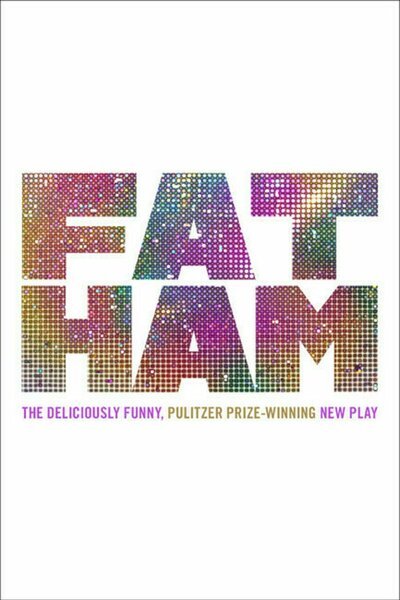
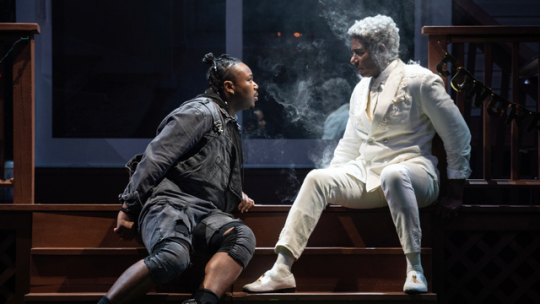
9 notes
·
View notes
Text

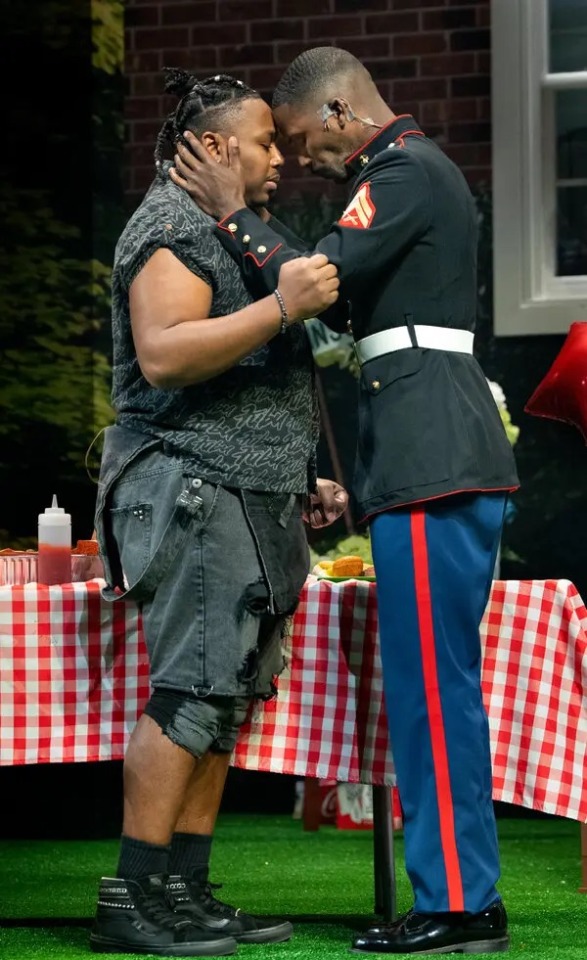
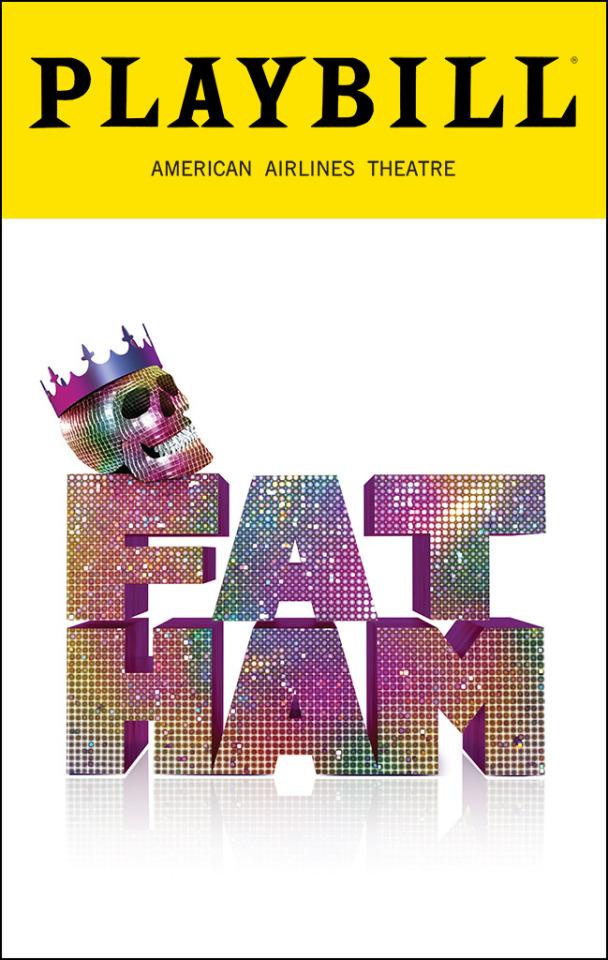
22 notes
·
View notes
Text
Not Anna K. Jacobs, co-writer of Teeth, following me on Instagram and messaging me that it means a lot to her that I love the show so much 😭
#MA’AM…. i love you#[dawn voice] please my nerves can’t take this#first james ijames and now this… i have to see every show exactly ten times ig#i'm gwen and i approve this message
4 notes
·
View notes
Text
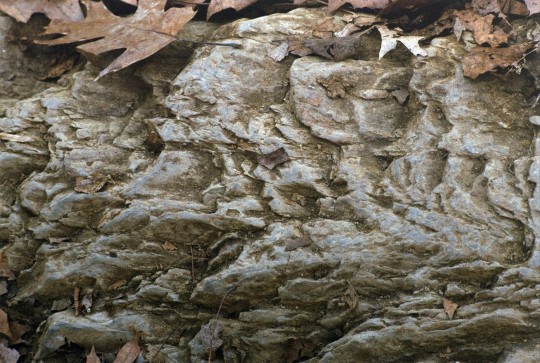
Ijams Nature Center, Tharp Trace trail, 2019ish
I have a series of rock photos from this hike, which is a tough one. I love how they all turn out.
Pentax k1000, fujifilm 400,
#photography#knoxville#fujifilm#pentax#tennessee#film#film photography#35mm film#ijams#ijams nature center#rock#geology#k1000#pentax k1000
2 notes
·
View notes
Text
“If you’re thinking about something every day, you’re not really remembering it. It’s just there, like heartburn.” — James Ijames, FAT HAM
#fat ham#quote#playwriting#James ijames#hamlet#theatre#theater#theatrical favorites#play quotes#quotation#playwrights#drama#dramatists#dramatist
4 notes
·
View notes
Text
Playwright James Ijames on 'Fat Ham,' the spotlight on Black queerness and life after a Pulitzer
A Q&A with the Pulitzer Prize–winning playwright of 'Fat Ham.'
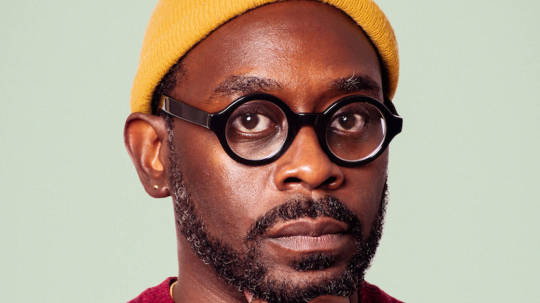
Written by Marcus Scott
Wednesday February 8 2023
James Ijames won the 2022 Pulitzer Prize for Drama for Fat Ham, an irreverent riff on William Shakespeare’s Hamlet that feels like a call to arms for Black joy and queer representation. A jambalaya of satire, magical realism and the American domestic sitcom, the play follows Juicy (Marcel Spears), a morose online-college student, as he tries to come to terms with the marriage of his newly-widowed mother, Tedra (Nikki Crawford), to his Machiavellian uncle Rev (Billy Eugene Jones). “This ain’t Shakespeare,” Ijames noted in the show’s program. “Don’t get me wrong. I love Shakespeare, this just ain’t him. This ain’t a tragedy…This play is offering tenderness next to softness as a practice of living. This play is celebrating Blackness that is traditional and weird and lonely and happy and grieving and honest and frightened and brave and sexy and churchified and liberated and poetic.”
Fat Ham had its world premiere in the spring of 2021 in a digital production by Philadelphia’s Wilma Theater. A year later, it made its onstage debut at the Public Theater, directed by Saheem Ali, and became one of the buzziest plays of the season. On March 21, 2023, that production will begin a limited run at Broadway’s American Airlines Theatre. We chatted over FaceTime with the playwright as he prepared to step into rehearsals.
Fat Ham moves Hamlet from a medieval Danish castle to a modern-day cookout in North Carolina. Why a barbecue?
“Barbecues are cumulative spaces. It starts with a few people and then it grows. There’s food, and people are drinking. It’s a space of truth-telling, it’s a space of game-playing, it’s a space of intimacy and warmth—and it’s where secrets come out. My family recently came together for the Christmas holiday and a cousin of mine made an announcement about being pregnant. Everyone was just so excited and lifted by that; everyone’s energy turned towards them in this really beautiful way. I wanted a space where that sort of collective joy was possible and also where a big, messy argument was possible. Where a fight was possible, where drinking was possible, where eating was possible, where romance was possible. In Shakespearean comedies, when you go outside or into the woods—like the forest of Arden [in As You Like It] or the forest in Midsummer—it’s a space where anything’s possible. There’s magic. We’re not inside, in a cold room in a cold castle. We’re outside: We have decorations, we’re colorfully dressed. We are in the sort of space where magic is palpable and possible.”
Juicy is not your typical Hamlet. He is Black and Southern and, as you describe him in the play, “thicc.” What was the motivation behind that?
“Well, I’m Black and from the South, and that drove my desire to play with people that sound and look like me. When you see productions of Hamlet, he's usually white and sort of athletic. I wanted to make a version of this play that was open to a body type that wasn't that; I'm a person who, for pretty much my whole life, has had some struggle with my weight and my perception of what I look like and how I feel in my body. And another thing I wanted to do was to explore Blackness in the South in a way that felt contemporary, that didn't feel held by history—looking at Southern communities right now as opposed to a nostalgic imagination of the Black South.”
Why did you choose for Juicy to have a passion to study Human Resources in college?
“Human Resources is about care and workflow. Efficiency. I wanted Juicy to have a passion for something that felt antithetical to his father. He wants to make sure people are okay.”
How does that contrast reflect other things about the way you have approached Shakespeare’s story?
“I think the play is exploring multiple modalities of masculinity. We see a lot of different kinds of Black masculinity on the stage. We see Juicy, we see Tio, we see Larry, we see Pap and Rev. And there’s a masculinity that’s implied about the community that they live in, that is sort of present in the room. I wanted to show that masculinity is not monolithic—it’s not as simple or cut-and-dried as it’s often depicted. I also wanted to explore cycles of trauma and violence in families. I’m interested in primordial stories, stories that no matter what culture you walk into, there’s like a version of them. I always think of Hamlet as—and I don't know that a lot of people think of it this way—but I think of Hamlet as a Cain and Abel story: the story of a sibling killing their sibling to get ahead. Anybody can relate to that; that’s a [narrative] that you inherit and moves with you through generations. And the younger folks in the play have to make some decisions about whether or not they want to continue that, whether that’s what they want their lives to look like and their relationships to each other to look like. I’m calling into question the stories that we’ve been passed down as wisdom. Because sometimes it’s wisdom, but more and more I look at those stories as cautionary tales of what you shouldn’t do. Vengeance isn’t gonna help Juicy. Killing his uncle is not gonna help Juicy’s life get any better.”
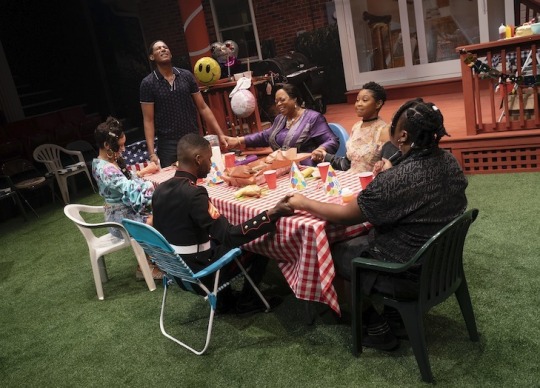
Your breakthrough play was Kill Move Paradise in 2017. How do you think you've changed as a writer since then?
“Oh, gosh. When I look at Kill Move Paradise, that play is quite erratic, you know [he laughs]. I always describe it as the way that I try to metabolize my anger and my fear and anxiety about being a Black body driving around in America, walking around in America, just trying to live my life. And so it has that anxiety in it. It has that fear and nervousness in it. It’s in the text, you can feel it on the page. As I've gotten a little older, I've experienced more and I've written more—the more you write, the better writer you become. I'm more intentional with story, with plot; how I'm weaving a theme or a theory into the action of a play is a bit more sophisticated than it was when I was starting out. The anger is usually shrouded in rebellion or exuberance. At a point in my life, anger sort of dragged me down into a space of high-blood-pressure fury. But I think now the work offers people an invitation to metabolize anger in a different way. By the time we get to the end of Fat Ham, people are dancing in the aisle.”
They certainly are.
“And that is not to negate the fact that we’ve just watched the thing that had pain in it, that had trauma in it, that had violence in it. But just because you’ve been through difficulty doesn’t consign you for the rest of your life to difficulty, to trauma, to pain. We have access to joy, we have access to resilience, we have access to exuberant ecstasy. Black history, in this country in particular, teaches us that: The blues and jazz and hip-hop come out of extraordinary awful scenarios and settings. Those art forms are undeniably both Black, but undeniably exuberant, resilient, unabashed, queer—all of those things! They possess all of those things. When I sit down to write a play, I know that at the end I have to send people out into the world, into the streets, into workplaces, into homes. My hope is that I’m leading them to some hope.”
This play is pretty fantastical, and there are various displays of spectacle and magic. There are also a panoply of images and homages to the Pan-African cultural experience—allusions to Louisiana Voodoo as well as Central African, Creole and Haitian Hoodoo symbology.
“Ghosts are a feature in a lot of my plays. Magic is a feature in a lot of my plays. Because I’m a person who grew up with people who kind of had magical ways of thinking. I grew up Baptist: hardcore, every Sunday, sang in the choir, youth ministry, youth usher—like, I am a church gay! I also grew up in a family that has New Year’s Eve traditions that they do, and will throw salt over their shoulder, or say “Don’t sweep over a single man’s shoe because he won’t get married.” That sort of Hoodoo connection to the spirit world and connection to ancestors was also a big part of the family that I grew up in. And so magic in that respect feels very real to me. Ancestors feel very present—the reverence for people who have passed on is immense. So, to me, the ghost of Juicy’s father showing up isn’t just a specter from this other world that is coming with caution and with information. Juicy is having a conversation with his ancestor and he talks to his ancestor, the way that I talk to mine. The thinness of that veil between here and there—I relish in that, and the theatrical allows you to do that with a lot of ease. I didn’t want the ghost to be a joke. He’s funny—that cat is extremely funny—but he also has these great moments of, like, “Wow, I really messed you up.”
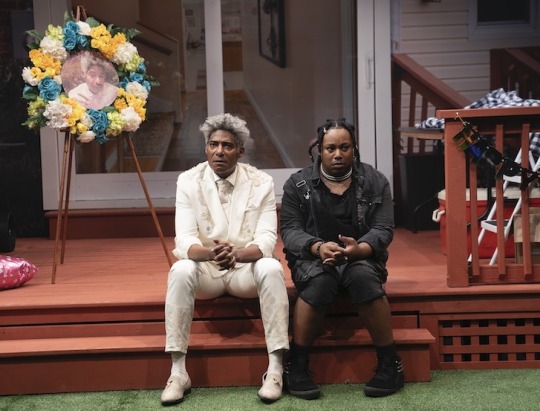
There is a long literary tradition of Black writers explaining Blackness to people who aren’t Black. You don’t do that here. In fact, this play comments on performing Blackness, trauma porn and “enterpainment” on stage—and it’s done with humor. Why was this important to you?
“Humor is powerful. It opens us up to hearing things in a new way. It’s a big part of all of my plays. The question about explaining Blackness is huge to me. I don’t feel like I have to explain Blackness to an audience. I’m assuming that everyone will catch up who doesn’t understand.”
At the end of the show, there’s a cover of the funky dance-pop disco tune “Kill The Lights” sung by Broadway actor Mykal Kilgore. What inspired that particular needle drop?
“I love disco music, just personally. Anybody can dance to it. If you are off-rhythm, you will be on a rhythm with disco music because it’s four-on-the-floor and is just all-encompassing. It strives for ecstasy, it strives for moving from a passage from one state to another. Probably because they were all like using drugs and having sex while they were listening to it in the Seventies and Eighties. But this is a contemporary artist singing in the disco style. It’s not a song from the era. It just moves people! That music moves people.”
If you were to classify your previous plays by genre, with Fat Ham being disco, what would your other shows be?
“Ooh.” [He laughs.] “I think Kill Move Paradise, if I had to put a genre to it, it’s Southern hip-hop, right? It’s sort of grounded in that culture. I would say White is like pop music—it’s like my Ariana Grande album. And Miz Martha is Americana music. It’s like bluegrass with a trap beat.”
Only nine writers of Black descent have been awarded the Pulitzer Prize for Drama in its 105-year history: Charles Gordone for No Place to Be Somebody, Charles Fuller for A Soldier’s Play, August Wilson for Fences and The Piano Lesson, Suzan-Lori Parks for Topdog/Underdog, Lynn Nottage for Ruined and Sweat, and the last four prizes in a row—Jackie Sibblies Drury for Fairview in 2019, Michael R. Jackson for A Strange Loop in 2020, Katori Hall for The Hot Wing King in 2021 and now you. Is something going on in the zeitgeist? Is there something special about Black writers that make their work more urgent right now?
“I think a few things are happening. Black writers and Black directors have been trying to push the form in new directions, to be both in conversation with the cannon and also pushing against the cannon. Those four plays—starting with Fairview and going to A Strange Loop, The Hot Wing King and Fat Ham—all four of those plays are actively doing those things. And so are some plays that haven’t won Pulitzers but have been defining culturally, like Slave Play and things like KPOP. The audience for that work is already there and primed, and it’s just waiting for someone to make art for them, you know what I'm saying? People are curious about what is possible in the form. I remember seeing Fairview and just being blown away by the audacity of it. It made me want to be more ambitious—to create more of a social experiment with my work in collaboration with an audience. I think the same thing is true of A Strange Loop and Hot Wing King in terms of those plays’ exploration of Black queer identity. And that flows rather beautifully into Fat Ham, which is doing the same sort of thing by taking a play that people cherish like Hamlet and saying, ’Not only is this mine, it’s mine in these particular ways, and this is what I’m gonna keep and this is what I’m gonna discard.’ So some of it is just us, as writers, wanting the form to feel as vital and as urgent as possible. And one way to do that is to examine how we write things and try to find new ways into storytelling.”
Those last three plays in particular have centered on Black queerness, and on what we might call radical softness. Is there something in the ether? Was there something in the culture that made us say, “Now that’s something we need to address, to attack, to appraise?” Because it all kind of happened around the same time.
“Hmm. I don’t know. That stretch of plays spanned the heartiest points of the pandemic, and we were all quite hungry for connection, closeness, touch, tenderness. And that offered an opportunity for people to be excited about seeing something that felt soft or vulnerable. I think people respond to that because we want to be better. Culturally, I think, we want to try to do things differently. It remains to be seen whether or not that will continue, but people wanted to engage with things that felt tender, that felt connective, and all of those plays are great examples of that. And I think that’s also true of Fairview; with the separation that it is asking for, it’s asking for people to sit in an embodied space with an idea.”
Last question: How has your life changed post-Pulitzer? Has that changed how people think of you and your work? Or how you think of yourself and your work?
“Oh my gosh! It’s just made my life so much busier, but it’s also made me focus on the work. Refocus on my craft and my practice. I don’t want this prize to freeze me in time. I want to keep pushing and keep expanding what I do.”
Fat Ham begins previews at the American Airlines Theatre on March 21, 2023, and opens on April 12. Tickets are available here. This interview has been condensed and edited for clarity.
Follow Marcus Scott on Instagram:@therealmarcusscott
Marcus Scott

#Marcus Scott#MarcusScott#WriteMarcus#Write Marcus#playwriting#playwrights#playwright#James Ijames#JamesIjames#Fat Ham#FatHam#Broadway#The Public Theater#Public Theater#Time Out#TIme Out New York#TimeOutNewYork#TimeOutNY#Time Out NY
6 notes
·
View notes
Text
Theatre Review: Fat Ham (Public Theater, New York) ★★★★★
Theatre Review: Fat Ham (Public Theater, New York) ★★★★★
While Michael R. Jackson’s 2020 Pulitzer Prize-winning musical A Strange Loop is enjoying a hit run on Broadway—and is deservedly the most Tony-nominated production of the season—downtown at the Public Theater a 2022 Pulitzer-winner, James Ijames’ Fat Ham officially opened last night, with its original run already extended twice until July 3rd. Both are extraordinarily impactful and hugely…
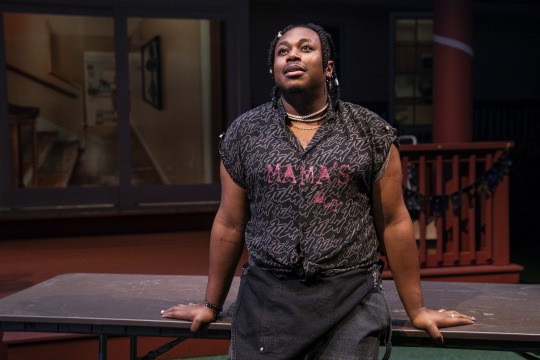
View On WordPress
#black queer hamlet#black queer hamlet fat ham#black queer tehater review#black queer theater#black queer theatre#fat ham black queer hamlet#fat ham play#Fat Ham Public Theater#fat ham pulitzer prize review#fat ham review#Gay theater#gay theatre#James Ijames fat Ham#James Ijames fat Ham review#James Kleinmann#lgbtq theater#lgbtq theatre#LGBTQtheatre#new play review#New York theater#New York theatre#new york theatre review#Public theater fat ham#pulitizer prize winning play#Pulitzer Prize fat ham#Pulitzer Prize winner#queer theater#queer theatre#queer theatre review#theater
8 notes
·
View notes
Text
youtube
Watch the American Climate Leadership Awards 2024 now: https://youtu.be/bWiW4Rp8vF0?feature=shared
The American Climate Leadership Awards 2024 broadcast recording is now available on ecoAmerica's YouTube channel for viewers to be inspired by active climate leaders. Watch to find out which finalist received the $50,000 grand prize! Hosted by Vanessa Hauc and featuring Bill McKibben and Katharine Hayhoe!
#ACLA24#ACLA24Leaders#youtube#youtube video#climate leaders#climate solutions#climate action#climate and environment#climate#climate change#climate and health#climate blog#climate justice#climate news#weather and climate#environmental news#environment#environmental awareness#environment and health#environmental#environmental issues#environmental justice#environment protection#environmental health#Youtube
17K notes
·
View notes
Photo
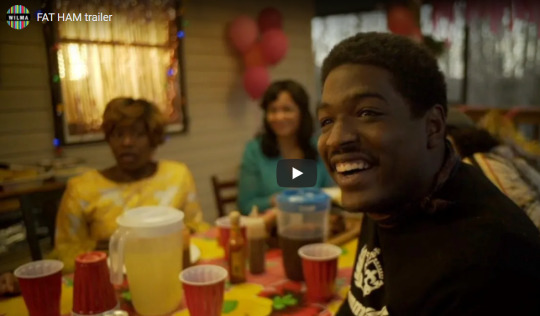
Thoughts to Fat Ham?
https://aalbc.com/tc/topic/9417-fat-ham-by-james-ijames-wins-2022-pulitzer-for-drama/#comment-52303
#rmaalbc
4 notes
·
View notes
Note
Have you gotten the chance to see Fat Ham? It might’ve juuuuuust closed (TRAGICALLY)—very much hoping it gets picked up somewhere else—but it’s an amazing version of Hamlet done through a Black family barbecue. I saw it at the Public Theater!
FUCK! FUCK IT JUST CLOSED
#it will definitely get picked up elsewhere though. I'm totally optimistic I will be able to see it#theater diaries#fat ham#hamlet#james ijames#shakespeare
8 notes
·
View notes
Text
The thing about doing something exciting is the crash afterwards knowing that the next exciting thing is months away—not that I can’t create my own joy and excitement, but I also can’t make productions of different plays happen every week or travel to go see them in different cities. Forgot how much I love live theater :( anyway, Fat Ham was so good and so gay. 🩷 The cast was terrific, the end was even better than I imagined, and the set design and costuming was *chef’s kiss*
0 notes
Link
For Ali, it started with performing Shakespeare with his peers in Kenya, where he was born and raised. “It was malleable. It was playable. It was completely adaptable,” he said. “Coming to the States, Shakespeare is this other thing: mostly white people, very few people of color, and they speak a certain way.”
He began inviting playwrights to work on Shakespeare adaptations with him. “I was like, ‘I want someone whose profession it is to work on the language. And I can talk about the world and the concept.’”
#kill move paradise (play)#shakespeare#william shakespeare#shakespeare and adaptation#fat ham#hamlet#saheem ali#james Ijames
9 notes
·
View notes
Text
youtube
Watch the 2024 American Climate Leadership Awards for High School Students now: https://youtu.be/5C-bb9PoRLc
The recording is now available on ecoAmerica's YouTube channel for viewers to be inspired by student climate leaders! Join Aishah-Nyeta Brown & Jerome Foster II and be inspired by student climate leaders as we recognize the High School Student finalists. Watch now to find out which student received the $25,000 grand prize and top recognition!
#ACLA24#ACLA24HighSchoolStudents#youtube#youtube video#climate leaders#climate solutions#climate action#climate and environment#climate#climate change#climate and health#climate blog#climate justice#climate news#weather and climate#environmental news#environment#environmental awareness#environment and health#environmental#environmental issues#environmental education#environmental justice#environmental protection#environmental health#high school students#high school#youth#youth of america#school
17K notes
·
View notes